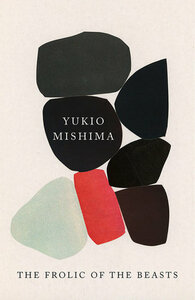Take a photo of a barcode or cover
challenging
emotional
slow-paced
Plot or Character Driven:
Character
Strong character development:
No
Loveable characters:
No
Diverse cast of characters:
No
Flaws of characters a main focus:
Yes
reflective
medium-paced
Plot or Character Driven:
Character
Strong character development:
Yes
Loveable characters:
Complicated
Diverse cast of characters:
No
Flaws of characters a main focus:
Yes
dark
reflective
tense
medium-paced
Plot or Character Driven:
Character
Strong character development:
Complicated
Loveable characters:
Complicated
Diverse cast of characters:
No
Flaws of characters a main focus:
Yes
Graphic: Infidelity
Moderate: Domestic abuse, Incest, Rape, Violence
‘The trees and the grass had begun to dry out from the morning dew and the previous day’s rain. The rising water vapor and sunlight appeared to completely cover the surface of the mountains and forests in trembling silver leaf. It was extremely quiet, so much so that it seemed as if the mountains and forests were lightly enveloped in some sort of glittering shroud of death.’
Left me wondering if the reason why I could finish this was because I already like Mishima’s writing before stumbling upon this? It’s between a 3 and 4 for me. Certainly not the book one should start with when/if unfamiliar with Mishima’s work. The storyline is rather unsatisfying, but perhaps it complements the primary inspiration of the book (a ‘Noh’ play, ‘Motomezuka’ – which was at its core lies an exploration of disappointing human connection(s) (an understatement, but that’s simply the gist of it)). Atmospheric, yes; but too much of ‘nothing’/very little going on.
Characterisation was mostly brilliant which makes the novel a very easy and quick read. It kept me interested every time a new one was introduced. But it also makes me feel rather conflicted about my inability to feel any form of sympathy for ‘Ippei’. Yet, my reaction to his – later condition cannot be described as anything quite like ‘satisfaction’ or ‘relief’. Is that what Mishima had intended, or? Because either way, I found it rather unnerving. And compared to all the Mishimas I’ve read, this one’s slightly more disturbing in terms of how the acts of violence were carried out. More simply done, but more intense and lingering – unlike ‘Life for Sale’ which was a truck load more comical (albeit darkly). But even so, not very effectively done. Either that, or I lack the ability to appreciate its subtlety.
‘Society heaps praise upon those individuals who refuse to be prejudiced against the unfair treatment life has dealt them. Indeed, it is deeply touched by the natural attitude to life displayed by these unnatural individuals. For Kōji, even a fight represented a semi-artificial impulse designed to elicit such praise. It was the expression of an attempt to behave normally in society…’
‘Had not Kōji desired to witness the very instant when the truth of perverse human nature begins to shine? The moment when a fake jewel emits the luster of the genuine article? Sheer delight itself? The manifestation of an irrational dream? The very moment when the ridiculous becomes the sublime?’
Like the protagonist in Haruki Murakami’s [b:Norwegian Wood|11297|Norwegian Wood|Haruki Murakami|https://i.gr-assets.com/images/S/compressed.photo.goodreads.com/books/1630460042l/11297._SY75_.jpg|2956680], Koji’s role in the book seems to be simply a carrier of the plot. Readers understand the events through Koji, yet it is done so in the way that makes him feel separated from all of it despite being the ‘trigger’ of some of climactic moment(s) in the story. He is almost like an extension of Yuko herself. I suppose when one sees it in this perspective, the structure and characterisation of Mishima’s novel somewhat resembles Emily Brontë’s [b:Wuthering Heights|6185|Wuthering Heights|Emily Brontë|https://i.gr-assets.com/images/S/compressed.photo.goodreads.com/books/1630501681l/6185._SY75_.jpg|1565818] (although this is too high of a compliment considering how much of a ‘hot mess’ Mishima’s novel is). Unlike other Mishima novel that I’ve read, this one comes with a ‘prologue’ and ‘epilogue’ which I’m still questioning the necessity of it/them. I don’t think either did much for the novel.
‘The drone of the machine saws had stopped, apparently for the lunch break. The surrounding area had become extremely quiet, save for the insistent wing beat of a greenbottle flying low around the convolvulus flower. Likely as not it had hatched from a discarded rotten fish on the beach, and having eaten its fill and become fat, it was now flying about in something of a faithless manner. It was a splendid combination of silver and dirt, and of cold metallic brilliance and warm putrefaction.’
The most disappointing bit for me was of how the characters were dealt with after an expected ‘deed’ was done. The characters’ reactions and submissive nature afterwards were shockingly disappointing. This may have ‘spiritual’ reasons (hence the addition of the side story of the bee-keeping priest) – so they didn’t bother to fuck with the ‘preordained destiny’ (as described in the novel). ‘Time’ went by rather slowly in the novel (with sudden quick events lodged in between the general monotony of the characters’ lives). And because the ‘deed’ is such a long-awaited, anticipated moment, readers’ expectations will be unsurprisingly high (or at least that was the case for me). But what the readers are left with is a very rushed ending dragging a collection of (in their own ways) wasted characters.
‘The night wore on. Having progressed more quickly than he had expected, Kōji set about working on the roof of the last greenhouse to finalize their work. Climbing from the top of the ladder onto the roof, he straddled the ridge—taking care not to step on the glass panes—and took hold of the long plywood panels that Teijirō handed to him. To help them with their work, all the fluorescent lights were ablaze in the greenhouses, and the resultant brightness lent the garden an otherworldly appearance.’
‘Beneath the light of the stars that shone down through the glass roof, the plants continued their subtle chemical action—with little or no movement they dropped leaves, lost petals, and released persistent smells, and some gradually decayed where they stood.’
The setting was definitely a highlight; and because of how well-composed it was, it saved the novel from being a hopeless mess. If you’ve read ‘Sound of the Waves’, the setting in this one would feel quite familiar to you. There is not much focus on the fishing culture/industry of the place in this one. In this book, all of that is replaced by floriculture. Rows of greenhouses with glassy built, and flowers being described as almost ‘human’ or at least more animated than what they are. Interestingly paired with people (with questionable ‘morals’) who manage them. They sustain one another in a ‘beastlike’ and mysterious manner. A quietly and tacitly perverse co-dependency – almost ‘too elegant’ to question (at first glance). I’m quite certain that this is the result of some Japanese folk-lore influence/inspiration. But alas, I am not familiar enough with it to make the connection – to a more specific ‘tale’. Mishima seemed to have arranged for them to be in that way – in a seamless juxtaposition that relates to the core of the story perfectly; and I’m endlessly in awe of how he’s once again performed this kind of literary ‘magic’.
‘…Kōji always felt sad at parting with the plants he had cultivated with so much tender care. The cymbidium, with its leaves similar to those of pampas, displayed an elegance as though it had caught some kind of disease-like “beauty,” through the form of its flowers, which float in the air like a sudden vision—a characteristic of orchids, together with its pale purple brushed petals, and lips with purple flecks scattered on a yellow background. To a greater or lesser extent European orchids had that same feel about them. The light red flowers of the dendrobium afforded a glimpse of dark purple in the depths of their tubes, yet they did not attempt to keep their bashfulness in the shade, rather, they seemed to explicitly reveal it. The Hawaiian anthurium was lurid red like synthetic resin with a rough feline tongue projecting from it. A seaweed-like delicate appearance of tiger tail contrasting with the tough nature of its dark green spotted leaves bordered with pale yellow. The large oval leaves of the Decora, an improved variety of rubber plant. The Ananas, with its audacious green bromeliad leaves sporting horizontal black stripes.’
‘Kōji dreamed of the worlds infiltrated by his dispersed flowers and leaves. He imagined a society of dazzling immensity and grotesque pitch-dark complication where these flowers and leaves hung, as if they were little ribbons secured here and there over its body. The flowers were mere caricatures there. These flowers and leaves would scatter and infiltrate shrewdly, like germs, a variety of entirely useless places in society for the purposes of practical sentimentalism, hypocrisy, peace and order, vanity, death, disease…’
The bit that I had found most impressive in the entire book was Kimi’s visit (albeit brief), or to be specific – her ‘interruption’. Kimi, introduced as ‘visitor’, but she’s not an ‘outsider’ at all (but that is only slowly revealed later after her departure from the island/place). Her brief interruption/intrusion to the trio’s lives can be argued as indirect provocations of the events later in the story (in her absence). It also makes me wonder why she didn’t retaliate when she was treated with a (albeit very small and brief) casual act of ‘violence’. Her response was ‘surprising’ but without any substantial meaning to it. Was she just ‘happy’ to be leaving the place, and felt lucky to have ‘missed a bullet’ there with whatever chaos that was about to go on in that house? Again, I felt like Mishima ‘wasted’ his very well-written characters by giving them such ‘rushed’ and disappointing ends/exits. Or was this simply his way of mimicking or translating the art of ‘Noh’ plays into novels? Like of how actors enter and exit the stage very quickly?
‘On a mere whim, she had clean-shaven one of her armpits, but left some stubble on the other. Her slightly stern face wore a frown, her mouth was like a beautiful half-open sea cucumber, and her dark skin was deeply reddened—maybe from the drink or perhaps from the lighting in the bar.’
‘Trying hard not to let his eyes reveal his gratitude, he held Kimi fixedly in his gaze…For the first time, he thought, I’m all body; just a physical presence—like a dog. He felt as though, for a short while at least, he had escaped from his preordained destiny.’
As much as I like the writing and the characters in the novel, I found the storyline a bit off. It’s certainly not Mishima’s ‘best’ (in my opinion). It lacks that meticulous organisation, ‘timing’ and general literary vibe that is so characteristic of his other novels that I’ve read. Perhaps it’s simply a satire that I could not and cannot appreciate well enough because I do not know well enough of its context (and of Noh plays in general). It’s my least favourite Mishima, but I’m glad to have read it anyway.
‘The soul, you see, is a shy and retiring thing. It lurks in dark places and dislikes sunlight. And so, if you do not keep the skylight open at all times, the soul will rot. It easily decays, like a fresh sea urchin.’
dark
emotional
mysterious
slow-paced
Plot or Character Driven:
A mix
Strong character development:
No
Loveable characters:
No
Diverse cast of characters:
No
Flaws of characters a main focus:
Yes
An interesting read, but not exactly to my taste.
In short, the themes of the book are adultery, violence, shame, repentance, and, not sure if is a theme or a device, but sexual tension.
The book was short, but it still took me a week to read it, because I was quite bored with it. Moments of poetic beauty saved it from 1 star.
In short, the themes of the book are adultery, violence, shame, repentance, and, not sure if is a theme or a device, but sexual tension.
The book was short, but it still took me a week to read it, because I was quite bored with it. Moments of poetic beauty saved it from 1 star.
challenging
reflective
sad
slow-paced
Plot or Character Driven:
Character
Strong character development:
Complicated
Loveable characters:
No
Diverse cast of characters:
No
Flaws of characters a main focus:
Yes
challenging
dark
mysterious
reflective
relaxing
tense
medium-paced
Plot or Character Driven:
Character
Strong character development:
No
Loveable characters:
Complicated
Diverse cast of characters:
No
Flaws of characters a main focus:
Yes
challenging
dark
sad
tense
slow-paced
Plot or Character Driven:
Character
Strong character development:
No
Loveable characters:
No
Diverse cast of characters:
No
Flaws of characters a main focus:
Yes
just kind of boring. not invested in any of the characters whatsoever and the prospect of finishing the book even though there’s only 100 pages left is very unappealing. the writing is beautiful but this was just not for me
dark
reflective
sad
slow-paced







